Will a Toilet Unclog Itself? Sometimes, But...
Author: Anne Cowart | Editor: Omar Alonso
Review & Research: Jen Worst & Chris Miller

Did you walk into the bathroom this morning to find your toilet clogged? Have you heard nightmare stories of toilets overflowing? The last thing you need is raw sewage spewing all over the floor and into the house. So, will a toilet unclog itself, or do you need to take immediate action to prevent the dreaded overflow?
Sometimes, a clogged toilet will release the clog over time, but it depends on a few factors. This post unpacks everything you need to know about toilet clogs, how they dissipate, and how to remove them.
Will a Toilet Eventually Unclog Itself?
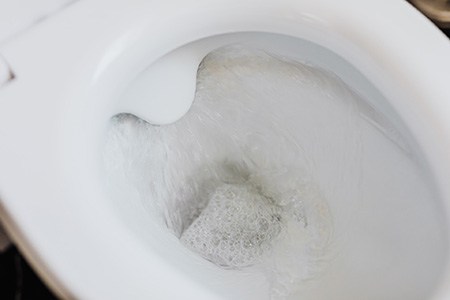
Most clogs consist of water-soluble materials that slowly degrade, loosen, and unclog themselves over time. If the toilet is clogged and you don't have a plunger, leave it for the day, and you'll probably find the clog dissipates when you flush later that night or the following day. The pressure from the flush is enough to break down the clog and clear the pipes.
If you only have one toilet in your home and can't wait for it to unclog itself, you will need to take action. That action should not be flushing the toilet unless you want a mess running over the floor. You'll need to assess the situation before leaving the clog to dissolve or planning to clear it yourself.
What Is the Size of the Clog?
How severe is the clog? You're dealing with a partial clog if you noticed the toilet backed up when you flushed and slowly drained. These clogs will likely clear by themselves without any intervention. If that's the case, wait an hour minimum and flush the toilet again to remove the clog.
We recommend waiting as long as possible to allow the clog to dissolve completely. It's better to be safe than sorry, or you'll spend the rest of the afternoon mopping up the toilet overflow. You have a severe clog if the toilet bowl fills without draining away, even slowly over time. That's a real problem.
What Problem Is Causing the Clog?
Clogs will only dissolve if they consist of organic materials that degrade in water. Anything other than septic-safe toilet paper, no matter the toilet paper roll dimensions, and human waste won't degrade in the water, causing the potential for the formation of severe clogs in the pipe that won't clear by themselves. If all you have is toilet paper and brown toilet water, then that can be okay.
Flushing diapers, feminine hygiene products, and flushable wipes down the toilet lead to severe clogs in the system. These items don't degrade in water. They cause clogs and create massive problems in septic systems.
The type of toilet also plays a role in the formation of clogs. Some handle clogs better than others. For instance, a septic tank system forms a blockage easily. Flushing the wrong materials down the pipes result in expensive repairs to the system. For example, never flush hair down the toilet as it'll cling to the sides and create a net for other materials to grab on to.
If you have a severe clog, it's time to grab the plunger. However, if you don't have a plunger in the house, we have a few ideas to help you remove the clog.
3 Methods to Unclog Your Toilet Without a Plunger
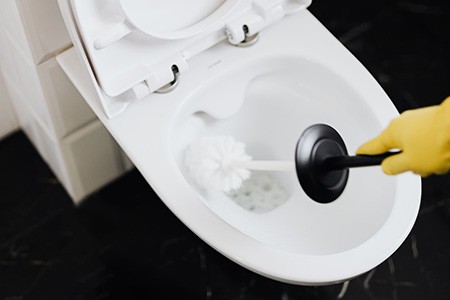
You might not have or even need any types of toilet plungers for this task. Give these three methods a try if you're dealing with a severe or minor clog in your toilet. If you do have a plunger but need guidance on how to use it, you can learn the plunging procedure here and learn more about how a toilet functions.
Method #1 – Hot Water
If you have a minor clog and the water drains slowly from the bowl, try adding hot water to remove the clog. Don't use boiling water from the kettle, and the temperature differential in the water might cause cracking in your bowl and pipes, especially in cold climates.
Hot tap water should be more than effective in clearing the blockage. Place a bucket in the bath, run the tap until it's hot, fill it, and steadily pour the hot water into the bowl. You should notice the water draining away faster and faster as the clog clears. You can unclog a drain with salt in some cases, so consider adding some salt in accordance with the information provided there.
Method #2 – Toilet Brush
The toilet brush is less effective than a plunger, but it's up for the task if the clog is close to the floor flange and pipe. A plunger forces water through the plumbing utilizing pressure build-up to clear the blockage.
While a toilet brush might not be able to build pressure in the system, it can work away debris causing the clog. It's only effective for clogs close to whatever types of toilet flanges are used in your home, but it might do the trick in a pinch. You know what they say, desperate times call for desperate measures.
Method #3 – Clothes Hanger Plumbing Snake
If you call a plumber to fix clogs on your plumbing, they'll use a "snake" to remove the clog if they can't get the plunger to do the job. A plumbing snake is a long steel or plastic tool that contorts to move around bends in the plumbing, pushing away debris causing the clog.
You can make a DIY plumbing snake using a wire clothes hanger. Unfold the clothes hanger, double it up and work it down the toilet to clear the blockage. Using a plastic-coated hanger is a good idea to avoid scratching the porcelain bowl.
How Do I Prevent My Clogged Toilet from Overflowing?
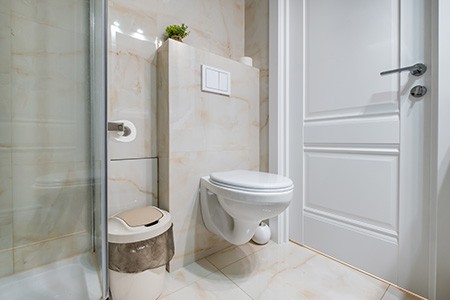
If the three methods above don't solve the issue, you'll need to follow these guidelines to ensure the toilet doesn't overflow while waiting for the clog to dissolve. This applies to all types of toilets with tanks (meaning pretty much all except a urinal).
Will a toilet unclog itself? Maybe, but it also won't overflow on its own, either, in most cases, even if the toilet water rises then drains slowly. The real risk comes when someone tries to flush it again, which is where we'll start this discussion.
Don't Flush the Toilet
Don't Flush! This is the biggest rule in waiting for a toilet to unclog itself. If the toilet isn't draining properly, flushing causes it to back up, overflowing onto the floor. Toilet overflows are hard to clean up, and there's a chance the surge could extend outside of the bathroom, ruining rugs and carpets.
If you have hardwood floors in the bathroom, the overflow might get in between the floorboards, causing a smelly, moldy, unsanitary mess when it dries.
Close the Water Valve
Most toilets have a valve in the water line extending from the wall to the tank. Turn off the valve. Turning right closes the valve, and turning left opens the valve. Some modern toilet designs might not have this valve assembly. Or the valve might be out of reach in some installations.
Stop the Tank From Refilling & Secure the Cistern Float
If you don't have a shutoff valve, lift the cistern (tank) and prevent the float ball and arm from dropping. This assembly shuts off water entry to the cistern when the water reaches a certain level in the tank. Place something under the float ball to close the valve. Don't worry about touching the water; it's clean.
Turn Off the Water Mains
If your toilet doesn't have a shutoff valve, and you can't lift the cistern lid because of the flushing assembly, turn off the water mains to the house. If you live in an apartment building, you won't have access to the water mains.
If that's the case, call the building manager and ask them to send the maintenance team around. These problems are usually covered in your lease agreement or your HOA terms of service. The building manager will have plenty of experience in handling these issues.
If you can't get hold of the building manager or the landlord over the weekend, you'll need to call a professional plumber. Or you can visit the local hardware store and purchase a plunger, they're inexpensive and a good thing to have around the house for these purposes.
FAQ’s About Clogged Toilets
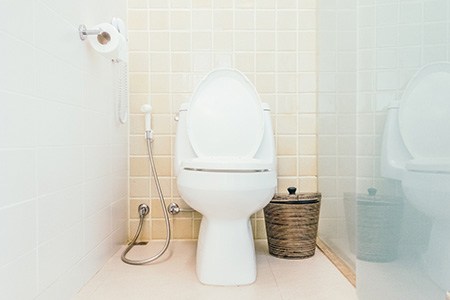
A handful of questions invariably come up when asking questions like "can a toilet unclog itself?". Let's cover those now.
Will Toilet Paper Unclog Itself?
Toilet paper is water-soluble, meaning it should dissolve over time and unclog itself. If the toilet paper is expired and degraded this will happen faster. A bit of movement in the water will help break the toilet paper into smaller pieces, increasing the speed at which it can dissolve. The water may take on a soupy appearance as the paper dissolves.
Can I Unclog My Toilet Without Using a Plunger?
Yes. It's possible to unclog the toilet yourself without using a plunger. Our post discusses three methods to unclog the toilet using items from around the house. Pour hot water down the toilet to dislodge the blockage, use a toilet brush to work it away, or fashion a DIY plumbing snake for the task.
How Long Does it Take a Toilet to Unclog Itself?
It depends on the material creating the clog. Water-soluble materials like toilet paper and waste can dissolve on their own and unclog within one to three hours. Wait no longer as it is rare for a toilet to unclog itself after that amount of time, and this indicates the clog will require intervention.
Do Flushable Wipes Cause Toilet Clogs?
You should only flush organic human waste and toilet paper. Flushing anything else puts the systems at risk of developing a clog. There's a new hygiene trend of using flushable wipes because the marketing of these products claims they're flushable.
However, that's not the case. Most flushable wipes brands contain materials that don't break down in the water, causing plumbing clogs. It's a huge problem in cities like New York with high-rise apartment buildings.
What Household Products Dissolve Toilet Clogs?
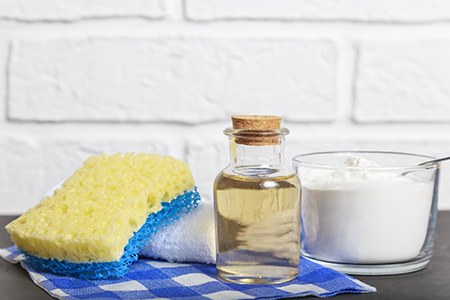
If the hot water trick doesn't dissolve the clog, you can step up this method by adding a cup of baking soda and two cups of white spirit vinegar to the hot water to make an organic drain cleaner. Let the solution sit in the toilet bowl overnight to loosen stubborn clogs. If it's not clear by the morning, call a professional.
Should I Put Dish Soap in My Toilet to Remove a Clog?
Yes. Adding dish soap or drain cleaner to the water will help to loosen the clog. A combination of hot water and dish soap will help to soften the clog, releasing it from the sides of the piping, and helping to lubricate the pipe in the mean time. It's not always effective at clearing severe clogs, but it's worth a try.
So, Will a Toilet Unclog Itself? Sometimes...
There are things you can do using household items and products to speed up the unclogging process or clear it up entirely. You don't have to wait and hope that the clog will dissolve and pass on its own. But will a toilet unclog itself? Sometimes, but being passive about it isn't the wisest move.




